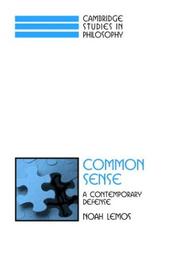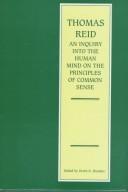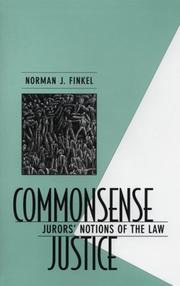| Listing 1 - 10 of 20 | << page >> |
Sort by
|
Book
ISBN: 0415023025 Year: 1989 Publisher: London Routledge
Abstract | Keywords | Export | Availability | Bookmark
 Loading...
Loading...Choose an application
- Reference Manager
- EndNote
- RefWorks (Direct export to RefWorks)
Common sense --- Horse sense --- Judgment --- Knowledge, Theory of --- Prudence --- Reason
Book
ISBN: 3428060997 9783428060993 Year: 1986 Volume: 45 Publisher: Berlin: Duncker und Humblot,
Abstract | Keywords | Export | Availability | Bookmark
 Loading...
Loading...Choose an application
- Reference Manager
- EndNote
- RefWorks (Direct export to RefWorks)
Sociology of knowledge --- Common sense --- Horse sense --- Judgment --- Knowledge, Theory of --- Prudence --- Reason
Book
ISBN: 0819165042 9780819165046 Year: 1987 Publisher: Lanham University press of America
Abstract | Keywords | Export | Availability | Bookmark
 Loading...
Loading...Choose an application
- Reference Manager
- EndNote
- RefWorks (Direct export to RefWorks)
Common sense --- Horse sense --- Judgment --- Knowledge, Theory of --- Prudence --- Reason --- Common sense.
Book
ISBN: 0837165393 9780837165394 Year: 1977 Publisher: Westport (Conn.): Greenwood,
Abstract | Keywords | Export | Availability | Bookmark
 Loading...
Loading...Choose an application
- Reference Manager
- EndNote
- RefWorks (Direct export to RefWorks)
Philosophy, Scottish --- Common sense --- Scottish philosophy --- Horse sense --- Prudence --- Judgment --- Knowledge, Theory of --- Reason --- Philosophie écossaise --- Sens commun
Book
ISBN: 178527550X 1785275496 1785275518 Year: 2020 Publisher: London : Anthem Press,
Abstract | Keywords | Export | Availability | Bookmark
 Loading...
Loading...Choose an application
- Reference Manager
- EndNote
- RefWorks (Direct export to RefWorks)
Common Sense and Science from Aristotle to Reid reveals that thinkers have pondered the nature of common sense and its relationship to science and scientific thinking for a very long time. It demonstrates how a diverse array of neglected early modern thinkers turn out to have been on the right track for understanding how the mind makes sense of the world and how basic features of the human mind and cognition are related to scientific theory and practice. Drawing on a wealth of primary sources and scholarship from the history of ideas, cognitive science, and the history and philosophy of science, this book helps readers understand the fundamental historical and philosophical relationship between common sense and science.
Science --- Common sense --- Normal science --- Philosophy of science --- Horse sense --- Judgment --- Knowledge, Theory of --- Prudence --- Reason --- Philosophy.

ISBN: 0521837847 051121734X 9780511217340 0511213743 9780511213748 051121197X 110716186X 1280540575 051121555X 0511315929 0511498802 0521143454 Year: 2004 Volume: *27 Publisher: Cambridge, UK ; New York : Cambridge University Press,
Abstract | Keywords | Export | Availability | Bookmark
 Loading...
Loading...Choose an application
- Reference Manager
- EndNote
- RefWorks (Direct export to RefWorks)
In this 2004 book, Noah Lemos presents a strong defense of the common sense tradition, the view that we may take as data for philosophical inquiry many of the things we ordinarily think we know. He discusses the main features of that tradition as expounded by Thomas Reid, G. E. Moore and Roderick Chisholm. For a long time common sense philosophers have been subject to two main objections: that they fail to give any non-circular argument for the reliability of memory and perception; and that they pick out instances of knowledge without knowing a criterion for knowledge. Lemos defends the appeal to what we ordinarily think we know in both epistemology and ethics and thus rejects the charge that common sense is dogmatic, unphilosophical or question-begging. Written in a clear and engaging style, this book will appeal to students and philosophers in epistemology and ethics.
Common sense --- Horse sense --- Judgment --- Knowledge, Theory of --- Prudence --- Reason --- Common sense. --- Knowledge, Theory of. --- Epistemology --- Theory of knowledge --- Philosophy --- Psychology --- Arts and Humanities
Book
ISBN: 1474417868 147441785X 1474438652 9781474438650 9781474417853 9781474417846 1474417841 Year: 2017 Publisher: Edinburgh Edinburgh University Press
Abstract | Keywords | Export | Availability | Bookmark
 Loading...
Loading...Choose an application
- Reference Manager
- EndNote
- RefWorks (Direct export to RefWorks)
With a new reading of Thomas Reid on primary and secondary qualities, Christopher A. Shrock illuminates the Common Sense theory of perception. Shrock follow's Reid's lead in defending common sense philosophy against the problem of secondary qualities, which claims that our perceptions are only experiences in our brains, not of the world.
Perception (Philosophy) --- Common sense. --- Knowledge, Theory of. --- Epistemology --- Theory of knowledge --- Philosophy --- Psychology --- Horse sense --- Judgment --- Knowledge, Theory of --- Prudence --- Reason --- Reid, Thomas, --- Jui-te, Tʻo-ma-ssu,

ISBN: 0748607226 Year: 1997 Volume: *2 Publisher: Edinburgh University Press
Abstract | Keywords | Export | Availability | Bookmark
 Loading...
Loading...Choose an application
- Reference Manager
- EndNote
- RefWorks (Direct export to RefWorks)
Common sense --- History --- 18th century --- Philosophy of mind --- Senses and sensation --- Horse sense --- Mind, Philosophy of --- Mind, Theory of --- Theory of mind --- Judgment --- Knowledge, Theory of --- Prudence --- Reason --- Philosophy --- Cognitive science --- Metaphysics --- Philosophical anthropology

ISBN: 0674036875 9780674036871 0674005562 9780674005563 0674146700 9780674146709 9780674005563 Year: 1995 Publisher: Cambridge, MA : Harvard University Press,
Abstract | Keywords | Export | Availability | Bookmark
 Loading...
Loading...Choose an application
- Reference Manager
- EndNote
- RefWorks (Direct export to RefWorks)
Norman J. Finkel explores the relationship between the law on the books, as set down in the Constitution and developed in cases and decisions, and what he calls commonsense justice, the ordinary citizen's notions of what is just and fair.
Law --- Jury --- Justice. --- Common sense. --- Horse sense --- Judgment --- Knowledge, Theory of --- Prudence --- Reason --- Injustice --- Conduct of life --- Common good --- Fairness --- Acts, Legislative --- Enactments, Legislative --- Laws (Statutes) --- Legislative acts --- Legislative enactments --- Jurisprudence --- Legislation --- Public opinion.
Book
ISBN: 9783110343403 3110343401 9783110343359 9783110394979 3110343355 3110394979 Year: 2014 Publisher: Berlin, [Germany] ; Boston, [Massachusetts] : De Gruyter,
Abstract | Keywords | Export | Availability | Bookmark
 Loading...
Loading...Choose an application
- Reference Manager
- EndNote
- RefWorks (Direct export to RefWorks)
While the popular talk of English common sense in the eighteenth century might seem a by-product of familiar Enlightenment discourses of rationalism and empiricism, this book argues that terms such as 'common sense' or 'good sense' are not simply synonyms of applied reason. On the contrary, the discourse of common sense is shaped by a defensive impulse against the totalizing intellectual regimes of the Enlightenment and the cultural climate of change they promote, in order to contain the unbounded discursive proliferation of modern learning. Hence, common sense discourse has a vital regulatory function in cultural negotiations of political and intellectual change in eighteenth-century Britain against the backdrop of patriotic national self-concepts. This study discusses early eighteenth-century common sense in four broad complexes, as to its discursive functions that are ethical (which at that time implies aesthetic as well), transgressive (as a corrective), political (in patriotic constructs of the nation), and repressive (of otherness). The selection of texts in this study strikes a balance between dominant literary culture - Swift, Pope, Defoe, Fielding, Johnson - and the periphery, such as pamphlets and magazine essays, satiric poems and patriotic songs.
Literature and society --- Common sense in literature. --- English literature --- Common sense --- History --- History and criticism. --- Social aspects --- Great Britain --- Intellectual life --- Horse sense --- Judgment --- Knowledge, Theory of --- Prudence --- Reason --- Common sense. --- English literature. --- eighteenth-century culture. --- eighteenth-century literature.
| Listing 1 - 10 of 20 | << page >> |
Sort by
|

 Search
Search Feedback
Feedback About UniCat
About UniCat  Help
Help News
News